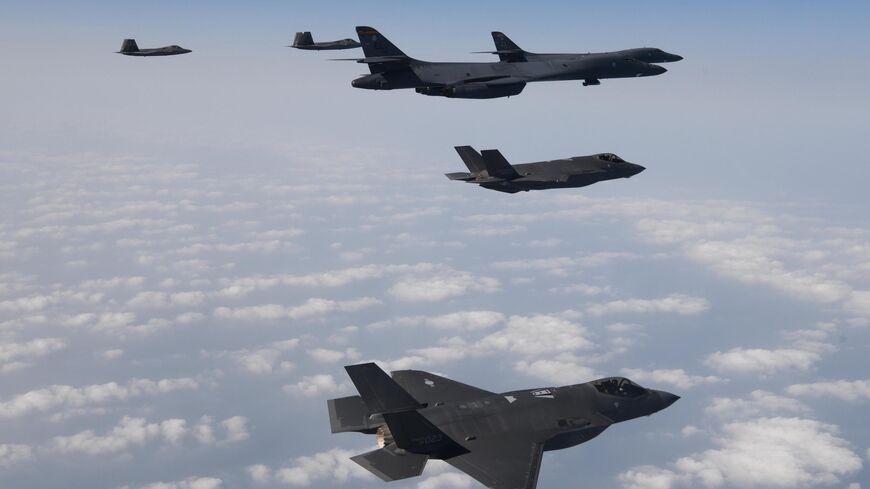WASHINGTON — The Pentagon has deployed advanced F-22 fighter jets to the Middle East in a bid to deter Russian military pilots' increasing harassment of American forces in Syria.
Stealth F-22 Raptors from the 94th Fighter Squadron based in Langley, Va., arrived at an airbase in the Levant region earlier this week from a deployment in Europe, defense officials said.
“The presence of the F-22 and the overmatching capabilities they possess provide the strongest of deterrents to escalation," a US Air Force spokesperson told Al-Monitor via email. "Their primary purpose is to contribute to the enduring defeat-ISIS mission and to demonstrate our resolve to defend coalition forces with overwhelming combat air power."
The commander of US Air Force units in the Middle East, Lt. Gen. Alexus Grynkewich, said the advanced fifth-generation fighters "will provide increased capability in the face of Russian unprofessional behavior in the air."
The top-tier, highly-maneuverable planes join other American combat aircraft already based in the region, including F-16s and A-10s, and have already begun flying missions over Syria, Grynkewich said in a statement provided to Al-Monitor.
Why it matters: This is the first time the US has deployed F-22s to the Middle East since responding to drone attacks on the United Arab Emirates last year.
The Pentagon approved the move in a bid to deter Russian pilots’ aggressive maneuvers in order to avert a potentially more serious confrontation, officials said.
US military officials have grown increasingly concerned with the crescendo of tense interactions with Russian pilots over Syria over the past several months, including armed overflights by fighter and ground-attack aircraft over US bases and outposts.
"Russian forces' unsafe and unprofessional behavior is not what we expect from a professional air force,” the top US commander in the Middle East, Gen. Michael "Erik" Kurilla, said in a statement on Wednesday.
American military officials have accused Russian pilots of regularly violating existing agreements not to enter US-controlled airspace over Syria without prior coordination, with some 85 incursions reported in May and April alone.
“In the context of global events, that is escalatory and entirely unprofessional,” Grynkewich told Al-Monitor in a statement on Wednesday.
Testing the waters: American officials say it’s not entirely clear why Russian pilots have been dialing up the pressure in recent months.
But the uptick comes amid criticism that the Biden administration has failed to articulate a wider regional strategy for Syria as Iran and Russia seek to capitalize on their own military footprints in the country.
Russia maintains more than 2,500 personnel in Syria in support of the Bashar al-Assad regime in Damascus, and has long sought US withdrawal from the country.
Some 900 American troops remain there, largely in the northeast, where they continue to carry out raids alongside local forces to uproot the remnants of the Islamic State group.
Deconfliction agreements have broken down between the US and Russian sides before.
In 2018, Russian Wagner mercenaries embedded with Syrian pro-regime forces attacked a US position near the Conoco gas field in eastern Deir Ezzor province. Then-Defense Secretary James Mattis said at the time the incident was unprovoked, and personally authorized a US military quick reaction force to destroy the attacking columns, leading to reports of as many as 300 Russian mercenaries killed.
Pentagon officials have actively sought to prevent such lethal incidents with the Russians in Syria since, saying hostile encounters put efforts to contain IS at risk.
American military officials first began noticing a pattern to Russian pilots’ intrusions early last year around the time Russia invaded Ukraine, one defense official said.
"They’ve done this episodically since 2019," Grynkewich said Wednesday.
By March of this year, defense officials said, Russian pilots had begun violating the de-confliction agreements nearly every day, particularly over the US Al-Tanf garrison in southern Syria along the Baghdad-Damascus highway – a route long thought to be coveted by Iran-backed militias.
"Compared to [their] behavior a year ago, Russian pilots have become significantly more unprofessional and unsafe," the defense official told Al-Monitor on Wednesday.
Senior US military officials expressed concern to Al-Monitor early this year that Russian and Iranian military leaders, driven together by cooperation in the war against Ukraine, may begin coordinating in Syria on their shared goal of pressuring the US to withdraw.
American pilots have shadowed their Russian counterparts from afar during the airspace incursions over the past year, Grynkewich previously said.
Know more: Russian pilots also flew in close during a major strategic exercise held in between US and Israel aircraft over the eastern Mediterranean in January.
Washington’s adversaries Iran and Russia have been working to cement their long-term influence in Syria in support of Assad. Russia maintains a strategic naval base on the Mediterranean at Tartous, while Iran's support for militias in Syria extends the IRGC's reach towards Israel.
Iranian President Ebrahim Raisi visited Damascus last month and vowed to help Assad’s regime with reconstruction. In March, Assad visited Moscow and invited more of the Kremlin’s forces into Syria permanently.
Meanwhile, the Biden administration’s reluctance to wield leverage over Arab states to prevent their diplomatic outreach to Assad after a decade of isolation has drawn sharp backlash in Congress.
Editor's note: This story has been updated since initial publication to include additional information.








